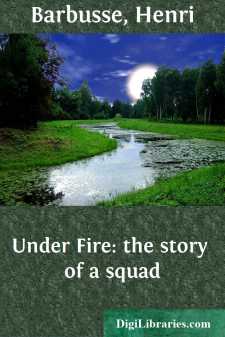Categories
- Antiques & Collectibles 13
- Architecture 36
- Art 48
- Bibles 22
- Biography & Autobiography 813
- Body, Mind & Spirit 142
- Business & Economics 28
- Children's Books 15
- Children's Fiction 12
- Computers 4
- Cooking 94
- Crafts & Hobbies 4
- Drama 346
- Education 46
- Family & Relationships 57
- Fiction 11828
- Games 19
- Gardening 17
- Health & Fitness 34
- History 1377
- House & Home 1
- Humor 147
- Juvenile Fiction 1873
- Juvenile Nonfiction 202
- Language Arts & Disciplines 88
- Law 16
- Literary Collections 686
- Literary Criticism 179
- Mathematics 13
- Medical 41
- Music 40
- Nature 179
- Non-Classifiable 1768
- Performing Arts 7
- Periodicals 1453
- Philosophy 64
- Photography 2
- Poetry 896
- Political Science 203
- Psychology 42
- Reference 154
- Religion 513
- Science 126
- Self-Help 84
- Social Science 81
- Sports & Recreation 34
- Study Aids 3
- Technology & Engineering 59
- Transportation 23
- Travel 463
- True Crime 29
Under Fire: the story of a squad
by: Henri Barbusse
Categories:
Description:
Excerpt
I
MONT BLANC, the Dent du Midi, and the Aiguille Verte look across at the bloodless faces that show above the blankets along the gallery of the sanatorium. This roofed-in gallery of rustic wood-work on the first floor of the palatial hospital is isolated in Space and overlooks the world. The blankets of fine wool—red, green, brown, or white—from which those wasted cheeks and shining eyes protrude are quite still. No sound comes from the long couches except when some one coughs, or that of the pages of a book turned over at long and regular intervals, or the undertone of question and quiet answer between neighbors, or now and again the crescendo disturbance of a daring crow, escaped to the balcony from those flocks that seem threaded across the immense transparency like chaplets of black pearls.
Silence is obligatory. Besides, the rich and high-placed who have come here from all the ends of the earth, smitten by the same evil, have lost the habit of talking. They have withdrawn into themselves, to think of their life and of their death.
A servant appears in the balcony, dressed in white and walking softly. She brings newspapers and hands them about.
"It's decided," says the first to unfold his paper. "War is declared."
Expected as the news is, its effect is almost dazing, for this audience feels that its portent is without measure or limit. These men of culture and intelligence, detached from the affairs of the world and almost from the world itself, whose faculties are deepened by suffering and meditation, as far remote from their fellow men as if they were already of the Future—these men look deeply into the distance, towards the unknowable land of the living and the insane.
"Austria's act is a crime," says the Austrian.
"France must win," says the Englishman.
"I hope Germany will be beaten," says the German.
They settle down again under the blankets and on the pillows, looking to heaven and the high peaks. But in spite of that vast purity, the silence is filled with the dire disclosure of a moment before.
War!
Some of the invalids break the silence, and say the word again under their breath, reflecting that this is the greatest happening of the age, and perhaps of all ages. Even on the lucid landscape at which they gaze the news casts something like a vague and somber mirage.
The tranquil expanses of the valley, adorned with soft and smooth pastures and hamlets rosy as the rose, with the sable shadow-stains of the majestic mountains and the black lace and white of pines and eternal snow, become alive with the movements of men, whose multitudes swarm in distinct masses. Attacks develop, wave by wave, across the fields and then stand still. Houses are eviscerated like human beings and towns like houses. Villages appear in crumpled whiteness as though fallen from heaven to earth. The very shape of the plain is changed by the frightful heaps of wounded and slain.
Each country whose frontiers are consumed by carnage is seen tearing from its heart ever more warriors of full blood and force....



